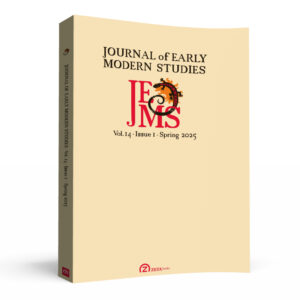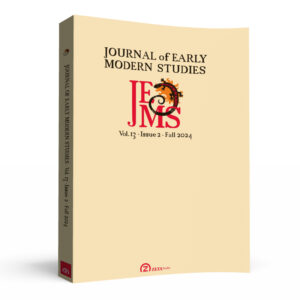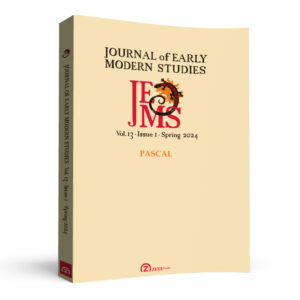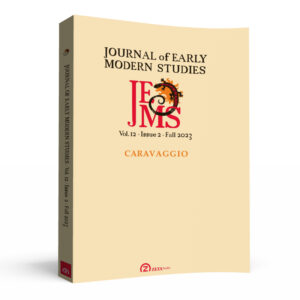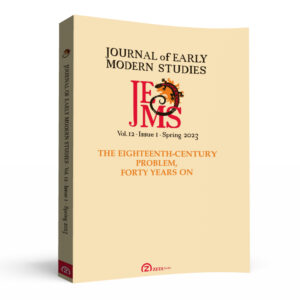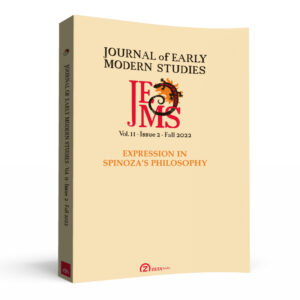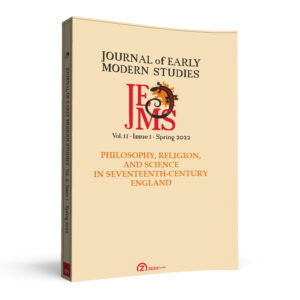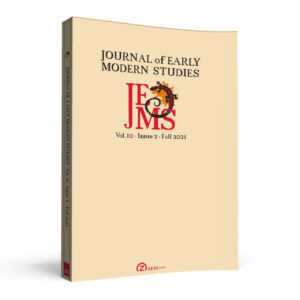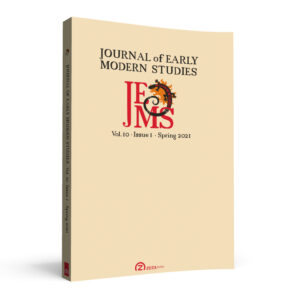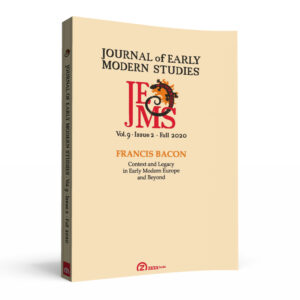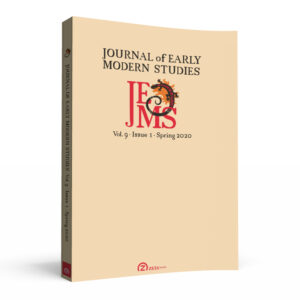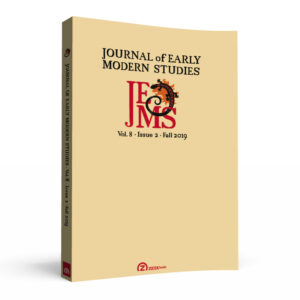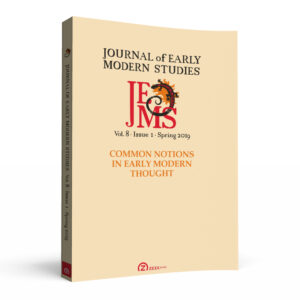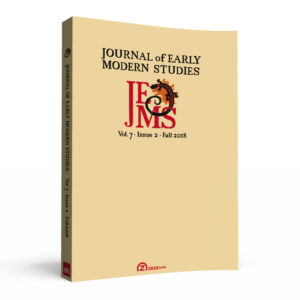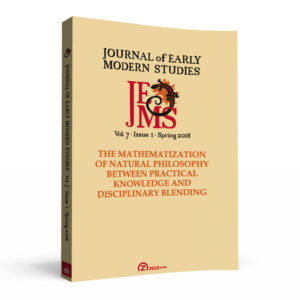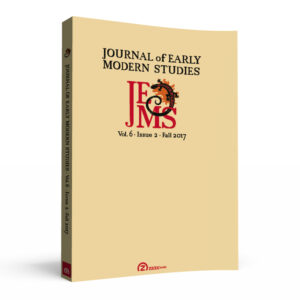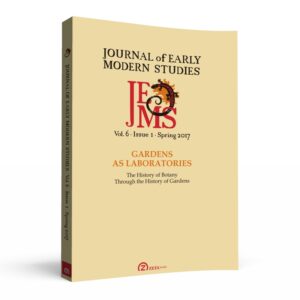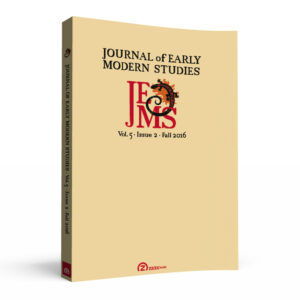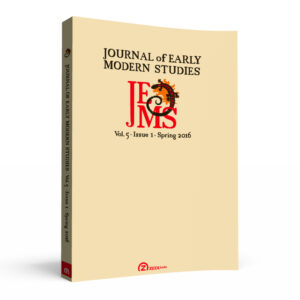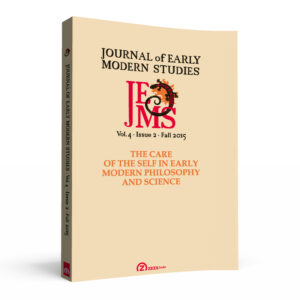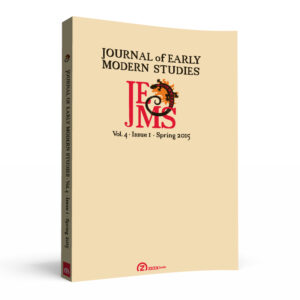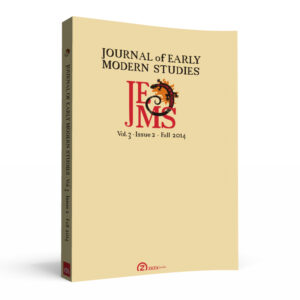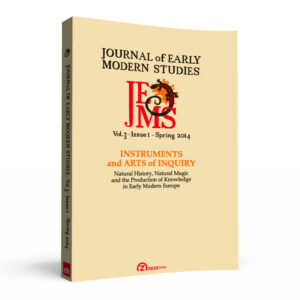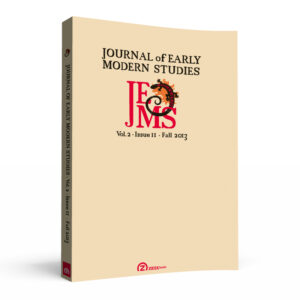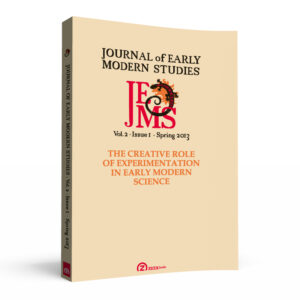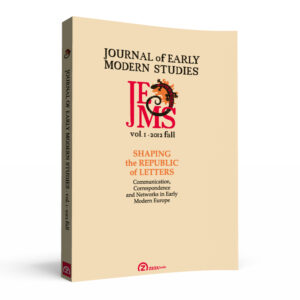Journal of Early Modern Studies
Edited in collaboration with the Research Centre “Foundations of Modern Thought”, University of Bucharest
ISSN: 2285-6382 (paperback)
ISSN: 2286-0290 (electronic)
Online Access via Philosophy Documentation Center
This subscription-based journal offers a hybrid open access option. If you are interested in this option, please Email Us.
For Institutional subscriptions (paperback or IP range, campus-wide online access), please Contact Us.
The Journal of Early Modern Studies is an interdisciplinary, peer-reviewed journal of intellectual history, dedicated to the exploration of the interactions between philosophy, science, and religion in Early Modern Europe. It aims to respond to the growing awareness within the scholarly community of an emerging new field of research that crosses the boundaries of the traditional disciplines and goes beyond received historiographic categories and concepts. JEMS publishes high-quality articles reporting results of research in intellectual history, history of philosophy, and history of early modern science, with a special interest in cross-disciplinary approaches. It furthermore aims to bring to the attention of the scholarly community as yet unexplored topics, which testify to the multiple intellectual exchanges and interactions between Eastern and Western Europe during the sixteenth, seventeenth and eighteenth centuries. The main language of the journal is English, although contributions in French are also accepted.
Submit an article: jems@zetabooks.com. See GUIDELINES FOR AUTHORS
Editors :
Vlad Alexandrescu (University of Bucharest, Romania)
Dana Jalobeanu (University of Bucharest, Romania)
Book Review Editor:
Sorana Corneanu (University of Bucharest, Romania)
Assistant Editor:
Grigore Vida (University of Bucharest, Romania)
Editorial Board:
Igor Agostini (Università del Salento, Lecce, Italy)
Peter Anstey (University of Sydney, Australia)
Delphine Antoine-Mahut (École Normale Supérieure de Lyon, France)
Roger Ariew (University of South Florida, USA)
Delphine Bellis (Université Paul-Valéry, Montpellier, France)
Élodie Cassan (École Normale Supérieure de Lyon, France)
Olivier Dubouclez (Université de Liège, Belgium)
Daniel Garber (Princeton University, USA)
Georgiana Hedesan (Faculty of History, University of Oxford, UK)
Jonathan Israel (Institute for Advanced Study, Princeton, USA)
Diego Lucci (American University in Bulgaria, Blagoevgrad)
Christoph Lüthy (Radboud University, Nijmegen, The Netherlands)
Scott Mandelbrote (Peterhouse, Cambridge, UK)
Gideon Manning (Claremont Graduate University, USA)
David Marshall Miller (Auburn University, USA)
Anne-Lise Rey (Université Paris-Nanterre, France)
Andrea Sangiacomo (University of Groningen, The Netherlands)
Koen Vermeir (Centre National de la Recherche Scientifique, Paris, France)
Rémi Vuillemin (Université de Strasbourg, France)
Advisory Board:
Jean-Robert Armogathe (École Pratique des Hautes Etudes, Paris, France)
Giulia Belgioioso (Università del Salento, Lecce, Italy)
Erik-Jan Bos (Erasmus University, Rotterdam, The Netherlands)
Vincent Carraud (Université de Paris IV-Sorbonne, France)
Stefano Di Bella (Università degli Studi di Milano, Italy)
Smaranda Elian (University of Bucharest, Romania)
Gérard Ferreyrolles (Université de Paris IV-Sorbonne, France)
Stephen Gaukroger (University of Sydney, Australia)
Peter Harrison (University of Queensland, Brisbane, Australia)
Howard Hotson (St Anne’s College, University Oxford, UK)
Sarah Hutton (University of York, UK)
Mihai Moraru (University of Bucharest, Romania)
Ovidiu Olar (“Nicolae Iorga” Institute of History, Romanian Academy, Bucharest)
Martine Pécharman (Centre National de la Recherche Scientifique, Paris, France)
Tamás Pavlovits (University of Szeged, Hungary)
Justin E. H. Smith (Université Paris Diderot, France)
INDEXING / ABSTRACTING COVERAGE
The Journal of Early Modern Studies can be discovered through the following services: Emerging Sources Citation Index Q2 (Web of Science), SCOPUS, ERIH+; CEEOL, EBSCO, EBSCO Discover, Google Books, Google Scholar, Philosophy Documentation Center, Philosophy Research Index, PhilPapers, ProQuest Summon, WorldCat Local.
Publication Ethics Statement
The editorial team of the Journal of Early Modern Studies is committed to ensuring the integrity of the publication process. Conformance to standards of ethical behavior is therefore expected of all parties involved: Authors, Editors, Reviewers, and the Publisher.
Authors should present an objective discussion of the significance of research work as well as sufficient detail and references to permit others to confirm a chain of reasoning or experimental result. Fraudulent or knowingly inaccurate statements constitute unethical behavior and are unacceptable. Review articles should also be objective, comprehensive, and accurate accounts of the state of the art. The authors should ensure that their work is entirely original works, and if the work and/or words of others have been used, this has been appropriately acknowledged. Plagiarism in all its forms constitutes unethical publishing behavior and is unacceptable. Submitting the same manuscript to more than one journal concurrently constitutes unethical publishing behavior and is unacceptable. Authors should not submit articles describing essentially the same research to more than one journal. The corresponding author should ensure that there is a full consensus of all co-authors in approving the final version of the paper and its submission for publication.
Editors should evaluate manuscripts exclusively on the basis of their academic merit. An editor must not use unpublished information in the editor’s own research without the express written consent of the author. Editors should take reasonable responsive measures when ethical complaints have been presented concerning a submitted manuscript or published paper.
Reviewers must treat received manuscripts as confidential documents. Privileged information or ideas obtained through peer review must be kept confidential and not used for personal advantage. Reviews should be conducted objectively, and observations should be formulated clearly with supporting arguments, so that authors can use them for improving the paper. Any selected referee who feels unqualified to review the research reported in a manuscript or knows that its prompt review will be impossible should notify the editor and excuse himself from the review process. Reviewers should not consider manuscripts in which they have conflicts of interest resulting from competitive, collaborative, or other relationships or connections with any of the authors or institutions connected to the paper.
The Publisher will respond to alleged or proven cases of research misconduct, fraudulent publication, or plagiarism in close collaboration with the editors. The publisher will ensure that appropriate measures are taken to clarify the situation and to amend the article in question if necessary. This may include the publication of an erratum, clarification or, in the most severe case, the retraction of the affected work. The publisher, together with the editors, shall take reasonable steps to identify and prevent publication of papers where research misconduct has occurred, and under no circumstances encourage such misconduct or knowingly allow such misconduct to take place.
FORTHCOMING
Journal of Early Modern Studies vol. 14 issue 2 (2025). General Issue.
Call for Papers:
Giovan Battista Della Porta and the Secret Shaping of Early Modernity. Guest Editor: Donato Verardi
Francis Bacon and His Legacies. Guest Editors: Dana Jalobeanu and Silvia Manzo
Mechanical Philosophy Across Generations. Guest Editors: Simone Bresci and Omar Hraoui

